Moving? Understanding Feline Behavior Will Help Ease the Transition
 Relocating is probably one of life’s most stressful situations. Even if you’re not moving far away, you still have to pack up your entire house, and if you’re down-sizing, you have some serious space issues to consider. Your cat has probably picked up on this change, especially if there have been garage sales or visiting buyers or renters for your current place. This can all be deeply upsetting to a cat who depends on routine. However, when you anticipate feline behavior, you can take better care of your cat’s needs.
Relocating is probably one of life’s most stressful situations. Even if you’re not moving far away, you still have to pack up your entire house, and if you’re down-sizing, you have some serious space issues to consider. Your cat has probably picked up on this change, especially if there have been garage sales or visiting buyers or renters for your current place. This can all be deeply upsetting to a cat who depends on routine. However, when you anticipate feline behavior, you can take better care of your cat’s needs.
Plan Ahead and Plan Well
It’s easy to assume that a truckload of cardboard boxes would make all of Fluffy’s dreams come true. However, when you start packing them up with all your goods, feline stress may be a major part of the equation.
Before you get your move underway, try to crate train your cat. This will not only give your pet a place of comfort and security, but you can close the door for your own peace of mind. Frightened, anxious, or stressed out cats tend to hide. If you provide a comfortable place for him or her to connect to this innate feline behavior, you can also reduce the risk of your cat bolting out the front door.
The Importance of a Chip
Microchipping is one of the best defenses against a lost or missing pet. While it’s important to keep your associated contact information until you actually move, do not forget to update it as soon as you arrive at your new place.
The Car
Cats typically do not like traveling, but you can do your part to get Fluffy used to cruising in your vehicle. Slowly increase your cat’s time in the car driving around. That way, you don’t have a completely freaked out cat on moving day.
How We Can Help
Once you know that a move is imminent, please make a wellness appointment for your cat. We can help with puzzling feline behavior, address any stress, and provide enough medication to get you through the big day. We can also discuss your cat’s diet and whether any adjustments are necessary to mitigate any GI issues or stress-related urinary tract problems. Updating vaccinations and remaining current on parasite preventives are very important before a move, as well.
Remember, we can help you manage your pet’s medical records and sign a health certificate for air travel if needed.
Boarding?
Sometimes, boarding your cat can greatly improve moving day productivity. Please let us know if you’d like to consider this option.
Before the big day (or prior to boarding), spend as much time as possible with your cat. He or she picks up on very subtle cues from you, so if you’re relaxed, playful, and loving, your cat will follow your lead.
Feline Behavior and a New Place
Cats are naturally highly territorial. Before you allow yours to roam freely around the house or yard, check the environment for any dangers, like torn screens, holes, or loose floorboards or fence posts.
Take Fluffy out for a walk with a leash and harness and allow him or her to create personal boundaries. Also:
- Introduce yourself and your cat to your new neighbors. Kindly ask that they let you know if they happen to see your cat wandering around.
- Don’t force your cat to experience your new house, yard, or neighborhood. Feline behavior makes it difficult to accept new living conditions, but over time (and with love, affection, and unwavering patience), your cat will come around.
- Unload your cat’s favorite things first. Have his or her bed, toys, perch, and food immediately available to ease the transition to the new house.
If we can help you with any questions or concerns, please do not hesitate to reach out to the team at Rocklin Ranch Veterinary Hospital. We’re always happy to help you and your cat!

